EVERYTHING YOU NEED TO KNOW ABOUT SCHOOL VISITS by Clare Helen Welsh
In a bookshop last week, I bumped into two sisters.They’d recognised me after I’d visited their school during World Book Week. Itwas such a surprise since we were miles from home and all on holiday! There wasmuch excitement from both parties, confirming to me the importance of school visits- getting into schools to reach and interact with readers.

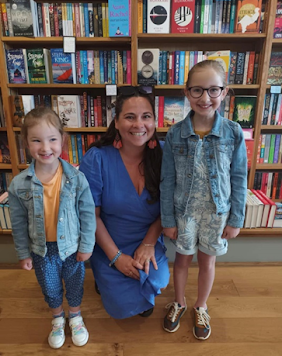
A CHANCE MEETING IN PADSTOW BOOKSELLER
But did you know, that in 2023 only onein five children said an author had visited their school, either online or inperson?
A Twitter thread from the National Literacy Trust and this chance encounter prompted me to write about schoolvisits for today’s Picture Book Den post. The National Literacy Trust researchedthe impact of author visits in schools (both online and in person). They foundthat children who attended author visits were more likely to enjoy reading andwriting in their free time. I’moften asked about school visits - what should they be like, how to prepare forthem, how to get them and do you have to be published to offer them? So, I thought this might be agood opportunity to champion school visits, and share a bit about how they can look.
Youcan read the full National Literacy Trust report here: Authorvisits in schools, and children and young people’s reading and writingengagement in 2023 | National Literacy Trust
WHATIS A SCHOOL VISIT?
School visits can in person or online.They can be with a whole school, with a key stage, with groups of classes or asingle class… or a combination of all of these! The school that has booked thevisit might have a purpose for your appearance in mind – to encourage reading forpleasure or to link with a curriculum topic - or your visit might be to celebrate thelaunch of your book. They can vary enormously, but this is good news! It meansthere is no set way they should be. If you play an instrument, why not makethis part of your session? You might be confident drawing, at home with apuppet or prefer talking with slides… play to your strengths and what you feelcomfortable with. It’s important for children to see there are lots ofdifferent kinds of authors, just like there are different kinds of people. And it's important that your school visit reflects you.
Whatever the theme of the day, I usually begin withsome fun facts and photos about me and my books on a screen. Consider includingthings like; previous jobs, childhood photos, your writing inspiration, yourwriting space… it might feel boring to you, but it’ll be fun and different forthem. If there’s no tech available, I do the same with props to keep thechildren’s attention.
In workshops, I always try to plan an activity thatsees the children take away something physical, and something that can be expandedon in class should the teachers wish to do so. I also make a big effort toensure the sessions are interactive and engaging, building in a strong hook sothat children can’t wait to start and will remember the day for a long timeafterwards. I tend to structure workshop sessions like this:
– Warmer
– Hook and shared activity
– Independent activity
– Share and tell
– Q&A/ Quiz


Here are some examples of the activities I’ve led inthe past:
- making sunny-side specs
- making lemur tail twisters (think tongue twisterswritten on tails!)
- biscuit tin crime scene
- design and make a biscuit rocket
- create your own story character
- 'creative compost' idea gathering workshop
- create your own graphic novel
- puppet making
Whatever you decide, it always nice to end aworkshop with a show and tell session. It’s unlikely you’ll have had chance tospeak to everyone individually, so asking them to talk with the person next tothem, and then a few feeding back to the whole group, gets around this problemnicely. I use my story TV and microphone, for this! It’s a bit of encouragementto share ideas, plus, who doesn’t want to be on TV?!
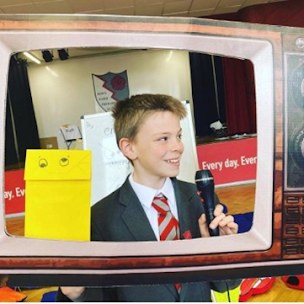
THE END OF A SCHOOL VISIT WORSHOP -
'SHOW AND TELL'
HOWDO YOU PREPARE FOR A SCHOOL VISIT?
It takes a lot of planning to ensure a school visit runs smoothly. This could include all or some of the following;
– communication with the school about logistics,payment and terms
– organising a book sale and liaising with a local bookshop
– making posters to advertise the event
– booking transport
– planning and resourcing
I also try to build children’s excitement andanticipation, by sending schools activities and material in advance. You mightbe the last author the children meet for some time – you might be the first oronly author they meet! Something that works nicely is sending ahead a writingcompetition to be judged on the day. You might be able to think of somethingthat links with your book or theme for the day.
I try to arrive around an hour before the eventstarts to set up and familiarise myself with my home for the day. It’simportant for me to leave plenty of time because I often bring lots ofresources that need unloading and because schools are busy places – yousometimes don’t know the finer details of where you’ll be based until youarrive and even then, plans can change. Also, if you’re going somewhere youhaven’t been before, leave in some buffer time for traffic, delays, parking (orthe lack of it) and getting lost! Better to have time to spare than bepanicked, I think.
Giving children the opportunity to buy books can belovely for all concerned. Some schools request a book signing, at the start or endof the day. If there’s a local bookshop to organise this, that’s great. If not,I set it up with a pre-order system so that I can source books from a sellerlocally to me. If your event is online, you might be able to liaise witha local bookseller and send signed/ dedicated bookplates.
After the event, I make sure to thank the staff fortheir help and hospitality, both in person and email. I usually follow up witha blog post and photo share, if I have been given to permission to take photos.This is something to check in advance.
In case you’re interested, a few yearsago I wrote a post forMy Book Corner with even more detail about my school visits. You can read thatpost here: AGuide to Author Visits by Clare Helen Welsh - My Book Corner]
HOWDO YOU GET SCHOOL VISITS?
It’s a great idea to have your contact andevent details on a website or on social media, showcasing what you can offer, including a price list. If you need advice on pricing, have alook at the Society of Author guidelines: Feesfor author school visits - The Society of Authors
Think about what makes you and your visits special. I travel by authormobile, so I try to share photos of this because it’s different. Author, Cara Matheson, takes her cockapoo, Scout!
As well as photos, you could also sharetestimonials from your events to help get the word out. If you’re a published authoror illustrator looking to do more events, you could also try contactingorganisations such as AuthorsAloud, AuthorsAbroad, ContactAn Author, ReadingRocks, NationalLiteracy Trust .

BLUNDELLS PREP SCHOOL
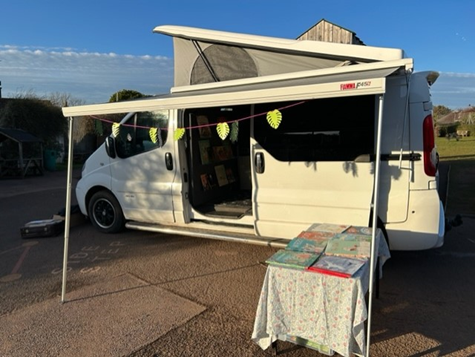
THE 'AUTHORMOBILE!'

AUTHOR, CARA MATHESON, AT A SCHOOL VISIT

'SCOUT' THE COCKAPOO!
WHOCAN DO SCHOOL VISITS?
I am keen to dispel the myth that onlypublished writers and illustrators can do school visits. I know firsthand howinspiring it can be for children to see the journey as opposed to just thefinished product. Any creative with a passion for what they do should feel ableto share that if they want to.
Sarah Dollar is a writer and poet looking for representation and a home forher picture book manuscripts. I asked her to share her school visit experiences:
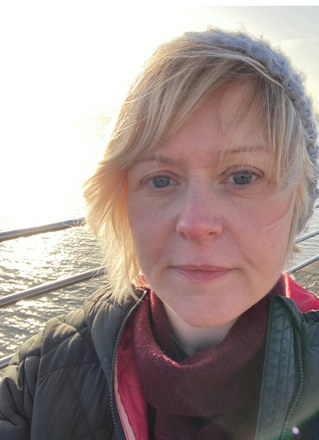
AUTHOR, SARAH DOLLAR.
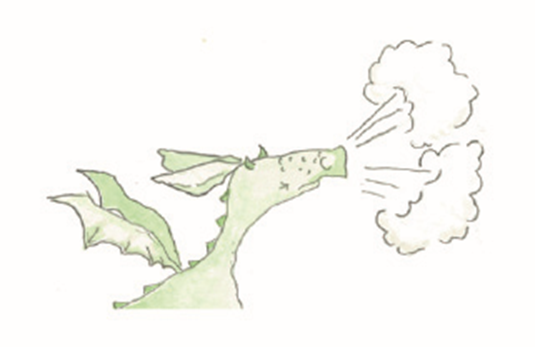 SARAH'S ILLUSTRATION OF 'MILDRED.'
SARAH'S ILLUSTRATION OF 'MILDRED.'“Mildred’ is an (as yet)unpublished character I created with my son, Hugo, in mind. He has severe foodallergies and Mildred suffers from hayfever. My thinking was that it would openthe door to meaningful conversations about allergies that might lead to moreunderstanding amongst his peers.
When Allergy Awareness Week cameround, I saw an opportunity to sidestep the gate-keepers and seek my ownreward. I’m not an overly confident person, but I suffer flashes of over-the-topenthusiasm. I collared his teacher, “I don’t know if you have anything plannedfor Allergy Awareness Week yet, but I’d be happy to read a story to the kids inHugo’ s class? ”. To mysurprise, and vague horror, she jumped on it! Before I’d left the playgroundshe had given me a day, a time and four classes to present to! Gulp!
I watched many Youtube videos,such as Joseph Coelho’s Poetry Prompts. I sought advice: wear something bright,take props, be prepared to be silly. Ipractised taking questions (from anyone willing to play along) and read thestory out loud - a LOT! I was nervous and met with a whispered chorus of ‘It’s Hugo’ s mum! ’, but the teacher introduced me as a writer. The children wereexcited.
My nerves settled quickly. I got afew children to help make Mildred’s soup concoction in a giant pan withimaginary ingredients. They laughed in all the right places. They engaged!Having repeated the session with another three class groups, I left the school- brimming. I floated out to the car park and stashed my props.
I did sessions for a nursery downthe road and when poetry day rolled around I was approached by another localschool. The kids enjoyed it. And I loved it. I may only have a few school visits under my belt, but the reactionfrom the children I've met has left me in no doubt - this is where my futurelies.”
What an inspiration, Sarah is! I hopeher experiences inspire you and give you permission to contact a school or bookshop or library for storytelling, if you wish. It doesn’t have to be pre-published or even published story. Why not take along a selection of your favourite books toshare?
If you’d like to find out moreabout Sarah and her visits, she’ll be featured in Write Mentor’s Final Wordnewsletter very soon. You can sign up for that here: Home - WriteMentor - for all writers ofchildren's fiction (write-mentor.com)
WHY DO SCHOOLVISITS?
If visiting a school has already been on your radar, I reallyhope this article and the National Literary Trust research have inspired youto take the plunge. In case you’re still unsure, have a read of these testimonials.School visits really do make a difference!
“Theworkshop was amazing! The children were engaged from start to finish. Such agreat way to get such young children to believe in themselves as writers! Thechildren haven’t stopped talking about where they are going to travel in theirrocket!”
“Theboys in Year 6 were so very proud of their writing and shared it first thingwith their teacher the following day who was blown away. Thank you again,it was a wonderful afternoon.”
“Allchildren were totally engaged and enthralled throughout the workshop. Clare wasfantastic with the children, bringing plenty of props to excite and provokecreativity from the group. The children were well guided and fully involvedthroughout the session.”
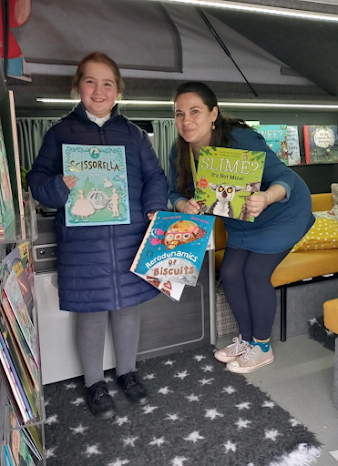
SARAH DOLLAR
Sarahwas born in London and grew up in Devon, where she lives now with her partnerand their three (very) energetic children. She writes short stories, picturebooks, chapter books, poems and even cryptic crossword clues! She waslonglisted for the 2021 Stratford Salariya Picture Book Prize and was includedin the finalists' showcase for Mindy Weiss’s Picture Book Party. Both pieceshave since been published. You will find her writing in places such as TheDirigible Balloon and Parakeet and Paperbound Magazine. She has alsocontributed to the spoken word event Book Jive Live. Find her on Twitter@SarahLCDollar.
CLARE HELEN WELSH
Clare Helen Welsh is a children's writer from Devon. Shewrites fiction and non-fiction picture book texts - sometimes funny,sometimes lyrical and everything in between! Her latest picture book is called 'Sunny Side Up,' illustrated by Ana Sandfelippo and published by Little Tiger Press. You can find out more about her at her website www.clarehelenwelsh.com or on Twitter @ClareHelenWelsh . Clare isrepresented by Alice Williams at Alice Williams Literary.



